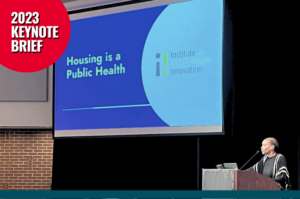By Joe VanHoose
 Hundreds of public health professionals from across Georgia convened Thursday in Athens at the 12th annual State of the Public’s Health Conference (SOPH), organized by the University of Georgia’s College of Public Health.
Hundreds of public health professionals from across Georgia convened Thursday in Athens at the 12th annual State of the Public’s Health Conference (SOPH), organized by the University of Georgia’s College of Public Health.
The conference explores approaches to tackling the most pressing public health issues affecting Georgia communities today, including mental health care access, improving maternal and child health, and topics on health equity.
At the keynote address Thursday morning, Abby Charles, MPH, made the case to the audience to consider the current affordable housing crisis in the U.S. as a public health issue as well.
Charles, program director for the Institute for Public Health Innovation, joined the organization after serving for five years at the Women’s Collective, a nationally recognized organization providing care, prevention, and advocacy services for women, girls and their families living with and at risk for HIV in the Metropolitan DC area. That work exposed her to the connection between health and housing.
“It is critical for the public health community to see housing as a public health issue and a healthcare issue,” she said. “If you don’t have housing, your health is almost nonexistent.”
Charles asked the audience, made up of state and federal public health professionals, academics, community-based organizations and nonprofit institutions, to think about how their own homes provide safety, security and stability.
“If you lacked that security and that safety, you’re constantly operating in this space of deficit,” she said. “(Being unhoused) constantly affects your physical health, it’s constantly affecting your mental health. You’re in this cycle of need.”
No state in the U.S. has an adequate supply of housing for the people who need it, Charles said. While the affordable housing crisis is felt hardest by people living in poverty, there are thousands of American workers who are making above poverty wages but are still unable to afford housing.
Further complicating the scope of the crisis, many unhoused people are living in vehicles or on the street and cannot be accurately counted, Charles said. Millions more are at risk of falling into a housing crisis and the health issues that follow.
“Public health has the lens that no one else has as it relates to epidemiology of disease and how we use data to solve issues,” Charles said. “How do we get to these solutions? First, we have to admit that housing is a public health issue. And we need to get public health leaders to be a part of the solutions to address housing.”
“The only way we’re going to be able to address all of this is through collaboration.”
